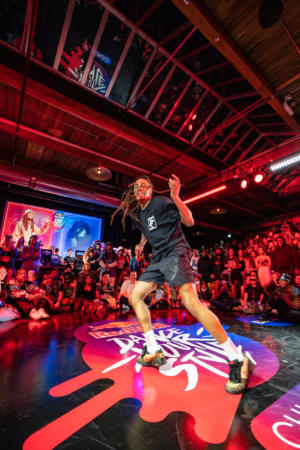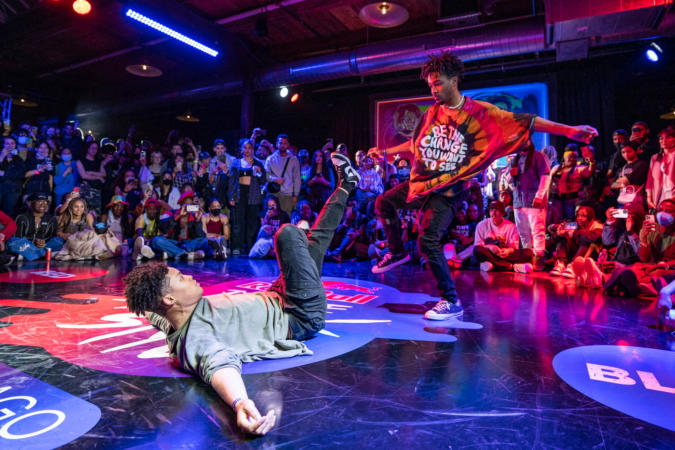To understand the importance of Black culture in dance, you have to know its history and preserve the past; you have to incorporate it into modern dance. Unfortunately, many dancers who participate in today’s prevalent dance challenges have no idea of its history, particularly TikTokers, where many choose likes and views over history and culture.
Many dancers who participated in Red Bull’s Dance Your Style value the preservation of dance within the community more than the act itself. BlavityU spoke to several competitors about the importance of dance in the Black culture. The dancers also discussed TikTokers stealing from Black creators and what dance means to them.
During the 1920s and 1930s, Black dance flourished in the United States, allowing the black musical theater to popularize and legitimized black dance traditions. Many black-influenced dance styles would be adopted and credited to their white counterparts, including the Charleston, the Lindy Hop, the Jitterbug, and the Twist. A practice that is still common to this very day.
The dancers spoke of their feelings toward white TikTokers stealing dances from Black creators and how it affects them personally and professionally.
View this post on Instagram
Nero The Professor
Nero The Professor, a 24-year-old dancer from Chicago, spoke explicitly about the creation of K Camp’s Renegade dance and how the credit initially went to the social media influencer, Charli D’Amelio.
“There is a little girl out there [Jalaiah Harmon] that created the renegade [dance] for [rapper] K Camp, and another person that was white [D’Amelio] got the credit for it,” Nero said. “And [Harmon] didn’t get credit for it until literally like two years after the dance had already [sic] blew up.”
In addition, the young dancer explained that this is normal for dancers like himself; he expressed that the world revolves around Black culture.
“But that’s the type of stuff that happens in our field. But not just in dance, it even goes for music. But all in all, the world revolves around Black culture because we are the ones that are always finding something fresh. And on top of that, we are fresh as hell, and it comes from experience.”

Nutella K
Nutella K, from New York City, understands the significance of Black culture and the connection dance has to the DNA of Black dancers. She explained the history of how the culture was created and why we had to build it from scratch.
“We created Black culture because we are not American. We came from somewhere, we were placed here, and because we didn’t understand our culture, we didn’t have a direct connection and a relationship to our culture; we came here and created a culture of our own,” Nutella said. ” So that within itself is significant. But even though we might not necessarily have direct alignment to where we stem from, it’s in our DNA.”
As the dancer continued, she described the culture, how it derived from Africa and the significance of dance to Black people.
“And so when you think of culture, you think of dance, food, style; these are all things that embody it. And when you go back to say—Africa, and you look at these different tribes,” Nutella said. “Dance is a part of the celebration and part of their lifestyle. And although I had never been to Africa a day in my life, but I can understand the body likes the movement. And that’s the significance that dance has to the culture because dance is culture.”
View this post on Instagram
Ivvy
Ivvy, a mother and wife, was lenient towards non-Black dancers who danced Hip-Hop and other Black-influenced dance styles, but all she wants is recognition. However, she spoke about the importance dance had on enslaved people and how they used it to escape their sad reality.
“From my experience, I was able to actually talk to some of my southern folks—well, I haven’t been able to talk to them, but I have some documents that I have going back to being abolished in slavery,” Ivvy said. “And that’s basically what all slaves did if they weren’t working. They were trying to get away from the poverty, get away from the stress, get away from the things that was oppressing them.”
View this post on Instagram
Nero, Ivvy and Nutella, comprehend the importance of dance in the Black community. During their dance career, the trio of African-American dancers incorporated their roots and heritage into their dance.
All three dancers recognized the importance of their careers in the community as they examined the lack of recognition for Black creators and their innovation in dance. Ivvy reiterated that the dance culture stems from young people running away from things they were trying to avoid in life, similar to their enslaved ancestors hundreds of years ago.

“Hip-Hop culture and dance [sic] is so important to Black people down to the point where it [sic] don’t even change the lifestyle that we have,” Ivvy said. “Because after we dance or after we do anything, we still got to go run home to poverty, PTSD, the gunshots, the gangs, the everything. So it’s very important—like even now, drill right now is a dance. But it was always something that we [sic] was trying to avoid.”
It would appear that history does indeed repeats itself. Whether it is Black dancers using different dance styles to escape their realities or to have their white counterparts steal from them with no conscious or guilt. It’s important to realize that as exciting, fun and stimulating as it looks, dance has a history, and it should be respected and honored.
